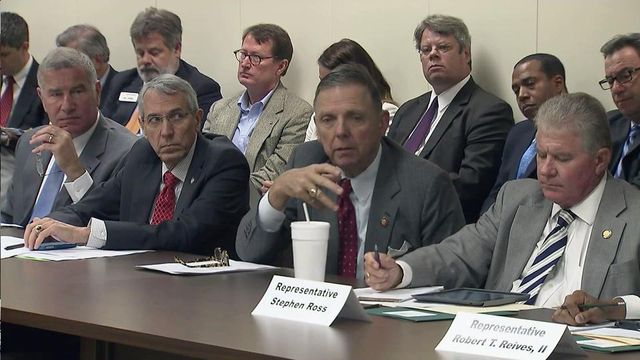House weighs employment fraud reform
House lawmakers are weighing competing arguments about how best to reform the state's laws governing how employers classify and pay taxes for workers.
Posted — UpdatedThe issue has been front and center this session after an investigative report by The News & Observer newspaper last year found widespread cheating of the system by unscrupulous employers. By classifying full-time employees as independent contractors, such employers can avoid having to pay FICA, unemployment and workers' compensation taxes for them.
This type of employment fraud is estimated to cost the state hundreds of millions of dollars every year in lost taxes. It also leaves the workers without recourse to workers' compensation if they're injured on the job and without unemployment benefits if they're laid off.
House Bill 482, the House version of a Senate bill sponsored by Sen. Buck Newton, R-Wilson, would set up a division to oversee the issue within the Department of Revenue, which would compare payroll reports to employers' reports and submissions to the Department of Labor, the Industrial Commission and other regulatory bodies.
The proposal would impose a $1,000 fine on employers who violate the classification law. The business would be banned from doing business with the state for five years, and occupational licensing boards would be instructed to rescind the licenses or permits of those found to be repeat offenders.
However, other versions of the bill would impose much stiffer penalties. One version would allow state labor regulators to issue a "stop work" order on a site if the employer is found to be cheating – a provision recently implemented in Florida – and the fine started out at $5,000, but was lowered, as sponsor Rep. Gary Pendleton, R-Wake, told the committee Tuesday, "after talking to all the players."
One big player, the North Carolina Chamber, argued against any greater penalties than those agreed to in House Bill 482.
Chamber chief lobbyist Gary Salamido argued that, while intentional misclassification is wrong and creates unfair competition, "We believe the laws on the books are adequate but need to be enforced."
The penalties in the bill, Salamido told the committee, are the end result of nearly a year of negotiations among stakeholders.
"We’re willing to take on $1,000. We’re willing to have people lose their licenses," he said. "It’s not easy, and it took a lot of conversation to get us there. Those are things I think people are uncomfortable doing."
"If we make it any more restrictive, we’re going to start to lose players," agreed Pendleton.
But others argued the legislation lacks teeth.
Bill Rowe with the North Carolina Justice Center said employment fraud hurts not only the misclassified employee, but taxpayers who have to cover the unemployment and medical costs cheating employers avoid, as well as businesses that are paying the required taxes but are trying to compete with others that evade them.
"It really is a business model that I think has developed over the years where folks think they’ll never get caught," Rowe told the committee. "Then if they ever get caught, it’s going to be a slap on the wrist."
"We need to think about whether or not we’re disincentivizing this business model," Rowe concluded.
Masonry business owner Doug Burton agreed, urging lawmakers to worry more about protecting law-abiding businesses than tax cheats.
"I’m a face of those that compete against this every day. I’ve been fighting it five to seven years, and I can tell you it’s a growing industry," Burton said. "The taxes you’re avoiding – it’s tough to overcome."
He estimated that "over half the people I see on bid day in this market" are engaging in employment fraud.
"Those that choose to misclassify – it's not out of ignorance," Burton said. "It’s intentional. They know they can get away with it."
But supporters argued again that the problem is enforcement, noting that evading withholding, unemployment and workers' compensation taxes are already all crimes that can be – but seldom are – prosecuted.
Subcommittee Chairman Rep. Chuck McGrady, R-Henderson, said House leadership wants "to move this bill relatively quickly," adding that he expects the subcommittee to have a proposal at its next meeting, which could be next week.
"The speaker’s office said, 'Let's make sure we get this right.' Obviously, there’s been a lot of interest," he told the committee. "I’m very mindful that there’s a balance here."
• Credits
Copyright 2024 by Capitol Broadcasting Company. All rights reserved. This material may not be published, broadcast, rewritten or redistributed.






